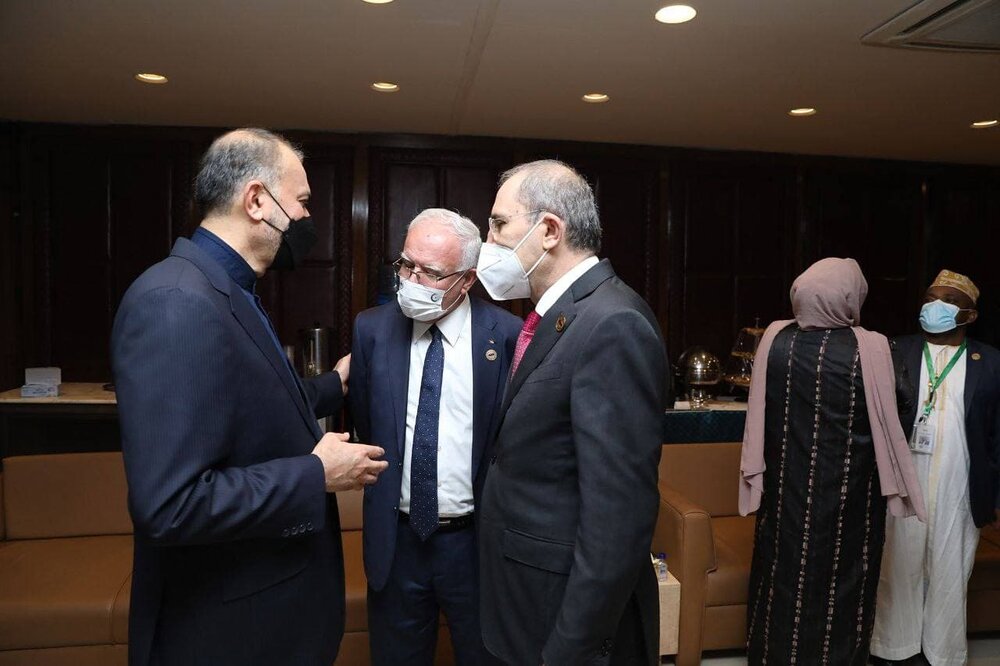Iran FM meets Jordanian counterpart

TEHRAN – Iranian Foreign Minister Hossein Amir Abdollahian met with his Jordanian counterpart Ayman Safadi during his visit to Pakistan.
Amir Abdollahian has left Tehran for Islamabad to attend the 17th Emergency Meeting of the Islamic Cooperation Organization's Foreign Ministers in Pakistan.
A political delegation is accompanying the Iranian foreign minister during this trip.
“The Foreign Ministers of the Islamic Republic of Iran and Jordan exchanged views on bilateral relations, regional developments and the issues of Palestine, Afghanistan and the Vienna talks,” the Iranian foreign ministry said in a statement.
In November, Safadi said all countries in the region want better relations with Iran based on the principle of good neighborliness and non-interference in internal affairs.
In an interview with the Arabic service of France 24, the Jordanian foreign minister said his country believes that a lot of regional issues need to be addressed and that’s why he talked to his Iranian counterpart Hossein Amir Abdollahian.
“We do not speak with anyone's proxies, and when we spoke, we spoke with the Iranian government directly through a phone call that the Iranian Foreign Minister had with me,” Safadi said, according to Ammon News, referring to his October telephone conversation with Amir Abdollahian.
He added, “Our position is clear. We want regional relations based on good neighborliness and non-interference in internal affairs, and many issues need to be addressed and discussed in this regard.”
The top Jordanian diplomat underlined that everyone in the Arab region wants good relations with Iran, but in order for these relations to be achieved, they must be based on clarity and transparency and on the principles of respect for neighborliness and non-interference in internal affairs, according to Ammon News.
The last telephone conversation between the foreign ministers of Iran and Jordan was held on October 11. In this conversation, Amir Abdollahian explained that Iran is in favor of friendly and brotherly relations based on mutual respect with regional countries and noted that the Islamic Republic and Jordan should benefit from economic and trade opportunities of the region to improve bilateral ties, according to the Iranian foreign ministry.
In the telephone conversation, Amir Abdollahian explained that Iran is in favor of friendly and brotherly relations based on mutual respect with regional countries and noted that the Islamic Republic and Jordan should benefit from economic and trade opportunities of the region to improve bilateral ties, according to the Iranian foreign ministry.
He expressed Iran's support for regional dialog and cooperation away from foreign interference and emphasized the expansion of cooperation among regional countries, especially Iran, Iraq, Syria, and Jordan, as a basis and driving force for further economic prosperity and stability in the region.
The top Iranian diplomat expressed support for the historical role of Jordan as custodian of the holy city of al-Quds and other Islamic and Christian sites in the city against the Zionist regime's efforts to exercise sovereignty over these places.
Abdollahian stressed the need for all Islamic countries to take responsibility regarding the issue of Palestine and the holy city of al-Quds. He emphasized the need for synergy among them regarding joint action in international organizations to help Palestine.
Abdollahian also reiterated Iran's stance regarding a referendum to determine the fate of Palestine, with the participation of its original inhabitants including Muslims, Christians, and Jews, as the only solution to the Palestinian issue. He described as unacceptable imposed plans that ignore the rights of the Palestinian people and prolong the occupation.
During the telephone conversation, Jordanian Foreign Minister Ayman Safadi also said Amman views relations with the Islamic Republic as important and respectable. He stressed the need for developing an understanding based on collective interests in light of regional conflicts.
Leave a Comment